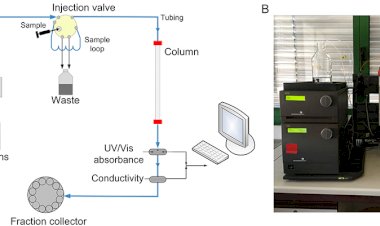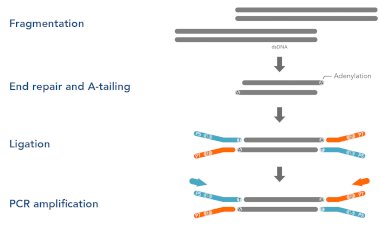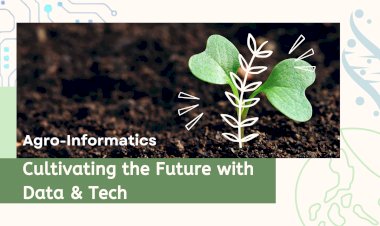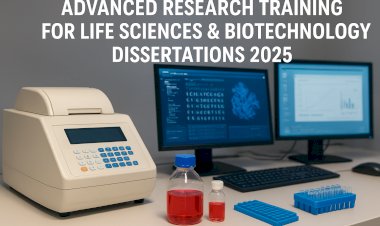Food Regulatory Affairs
Food Regulatory Affairs (FRA) ensures that every food product meets national and international safety, quality, and labeling standards. This blog explores the crucial role of regulatory frameworks such as FSSAI, Codex Alimentarius, US FDA, and EFSA in protecting public health and promoting fair trade. It highlights the responsibilities of regulatory professionals, emerging trends like digital traceability and sustainability, and the growing career opportunities for students in life sciences, biotechnology, and food technology. The article also introduces IBRI Noida’s specialized training programs that prepare students to excel in food regulation, compliance, and documentation—bridging science, industry, and policy for a safer global food system.
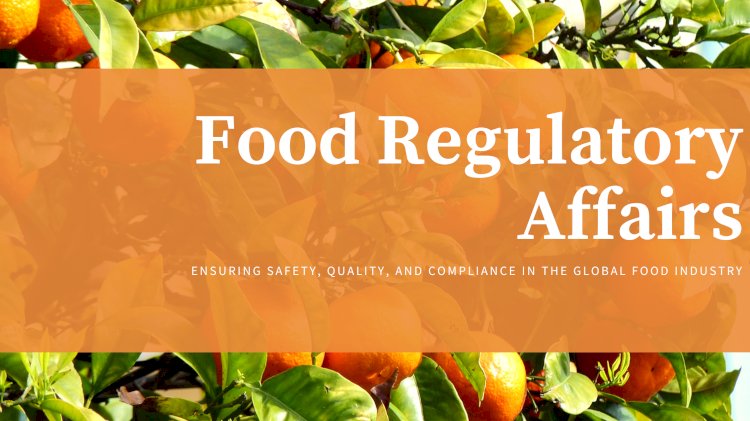
Food is more than just nourishment—it’s a matter of safety, trust, and global commerce. Every packaged food, beverage, or nutraceutical product available on the market has passed through a maze of regulatory checkpoints designed to protect consumers and ensure product integrity. This complex and crucial process is governed by Food Regulatory Affairs (FRA) — a specialized discipline that connects science, law, and policy to safeguard public health and ensure compliance across the food industry.
For students of life sciences, food technology, biotechnology, or pharmacy, understanding the principles and practices of Food Regulatory Affairs is not just valuable—it’s becoming essential in today’s food innovation ecosystem.
What is Food Regulatory Affairs?
Food Regulatory Affairs refers to the application of food laws, regulations, and policies to ensure that food products are safe, properly labeled, and compliant with both national and international standards. It acts as a bridge between the scientific development of products and their legal approval for sale.
Professionals in this field work closely with regulatory agencies, research teams, and quality assurance departments to ensure that every ingredient, process, and claim associated with a food product meets strict regulatory guidelines. From formulating new functional foods to ensuring accurate nutritional labeling, the goal is to maintain consumer safety and uphold the credibility of the food industry.
Why Food Regulatory Affairs Matters
The world’s food supply chain has grown increasingly complex, with ingredients and finished products crossing multiple borders before reaching consumers. Without effective regulation, public health could be at risk. Here’s why Food Regulatory Affairs is indispensable:
1. Protecting Public Health
Ensuring food safety is the foremost goal. Regulatory frameworks prevent contamination, adulteration, and mislabeling, reducing the risk of foodborne illnesses and allergen exposure.
2. Maintaining Consistent Quality
Regulatory compliance ensures that every batch of food produced maintains uniform standards in terms of composition, taste, and safety, regardless of where it’s manufactured.
3. Facilitating Innovation
Emerging food technologies—like plant-based proteins, probiotics, and nutraceuticals—need regulatory guidance before entering the market. Regulatory experts help companies navigate approvals while maintaining compliance.
4. Supporting Global Trade
With the rise of international food markets, understanding multiple regulatory frameworks (FSSAI, FDA, EFSA, Codex) is key to ensuring smooth import/export operations.
5. Building Consumer Trust
Accurate labeling, transparent ingredient disclosure, and verified claims foster consumer confidence—a major driver of brand loyalty.
Key Regulatory Bodies and Standards
1. FSSAI (India)
The Food Safety and Standards Authority of India (FSSAI) is the apex regulatory body overseeing all food safety and quality matters in India. Established under the Food Safety and Standards Act, 2006, FSSAI consolidates various older food laws into one integrated framework.
FSSAI’s core responsibilities include:
- Licensing and registration of food businesses (FBOs)
- Setting safety and labeling standards
- Regulating additives, preservatives, and contaminants
- Monitoring nutraceuticals and dietary supplements
- Implementing Food Safety Management Systems (FSMS)
Example: Before launching a fortified cereal in India, companies must ensure it complies with FSSAI’s regulations on nutrient fortification, permissible additives, and packaging claims.
2. Codex Alimentarius
An international food code established jointly by the FAO and WHO, the Codex Alimentarius Commission provides globally recognized standards for food safety and trade.
Codex serves as a reference for global trade agreements and promotes harmonization between countries—ensuring that food exported from one nation is safe and acceptable in another.
3. US FDA (Food and Drug Administration)
In the United States, the FDA ensures that food products (excluding meat and poultry, which fall under USDA) meet safety and labeling standards. The FDA’s Food Safety Modernization Act (FSMA) emphasizes prevention rather than response—requiring manufacturers to implement proactive safety measures.
4. EFSA (European Food Safety Authority)
The EFSA provides independent scientific advice on food risks within the European Union. It assesses contaminants, additives, GMOs, and nutritional claims to support EU food legislation and ensure the highest standards of consumer protection.
The Role of a Food Regulatory Affairs Professional
Food Regulatory Affairs professionals are the backbone of compliance and documentation within the food industry. Their work ensures that every food product introduced to the market adheres to safety, labeling, and quality norms.
Typical responsibilities include:
- Reviewing and submitting regulatory dossiers for product approval
- Preparing and validating ingredient specifications and safety reports
- Ensuring compliance with local and international labeling laws
- Liaising with regulatory agencies and certification authorities
- Keeping updated with evolving food standards and guidelines
- Managing recall procedures and risk assessments
In essence, these professionals are the guardians of consumer safety and the interpreters of complex regulatory language for businesses.
Emerging Trends in Food Regulatory Affairs
As technology, science, and sustainability evolve, food regulatory systems are also adapting. Key trends include:
1. Novel Foods & Alternative Proteins
The rise of plant-based, lab-grown, and insect-derived proteins calls for new safety assessments and labeling guidelines.
2. Functional Foods & Nutraceuticals
With consumers increasingly seeking health benefits from food, regulatory clarity on health and nutrition claims is crucial.
3. Digital Traceability Systems
Blockchain and IoT technologies are enhancing supply chain transparency and recall efficiency.
4. Sustainability Regulations
Eco-labeling, recyclable packaging, and carbon footprint reporting are becoming integral to food compliance standards.
5. Harmonization of Global Standards
Efforts by Codex and international agencies aim to standardize food laws, simplifying international trade and compliance.
Career Opportunities in Food Regulatory Affairs
The demand for skilled regulatory professionals is rapidly increasing due to global trade, product innovation, and stricter safety laws.
Career opportunities include roles such as:
- Regulatory Affairs Officer / Associate
- Food Compliance Specialist
- Labeling and Documentation Expert
- Quality Assurance Manager
- Product Registration Executive
- Food Safety Auditor
Industries that hire food regulatory experts:
- Food and Beverage Manufacturing Companies
- Nutraceutical and Dietary Supplement Firms
- Government Regulatory Agencies (e.g., FSSAI, BIS)
- Consultancy and Certification Bodies
- Research Organizations and Testing Laboratories
Skills Required:
Knowledge of food law, analytical reasoning, attention to detail, scientific writing, and familiarity with international regulatory databases.
How IBRI Noida Empowers Students in Food Regulatory Affairs
At IBRI Noida (Institute of Bioinformatics and Research Institute), students are trained to become industry-ready professionals in regulatory affairs and life sciences.
The institute offers specialized certification and training programs in Food Regulatory Affairs, Bioinformatics, Pharmacovigilance, Molecular Biology, and Clinical Research.
Why Choose IBRI Noida?
- Industry-aligned curriculum: Designed by experts from the biotech and regulatory sectors.
- Hands-on training: Students learn practical aspects of documentation, FSSAI compliance, labeling laws, and dossier preparation.
- Expert faculty: Trainers with real-world experience in regulatory and food industries.
- Career support: Internship opportunities, industry projects, and placement guidance.
Whether you are a BSc/MSc Life Sciences, Food Technology, or Biotechnology student, IBRI Noida provides the foundation to build a rewarding career in Food Regulatory Affairs — a field that combines science, policy, and public health to make a real-world impact.
Apply now: https://ibri.org.in/admission-form.html
info@ibri.org.in
www.ibri.org.in
Conclusion
Food Regulatory Affairs stands at the intersection of science, safety, and society. It ensures that every item on our plate meets the highest standards of quality and compliance. For aspiring professionals, it offers an exciting opportunity to contribute to public health, global trade, and sustainable food innovation.
With structured learning and expert guidance from institutions like IBRI Noida, students can develop the skills and confidence to thrive in this growing domain and shape the future of food safety worldwide.






















